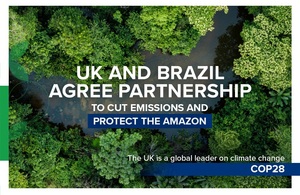UK leads global action to protect rainforests, cut methane emissions and advance low carbon technologies
UK commits more than £85 million funding at COP28 to tackle deforestation and cut methane emissions.

- Energy Security Secretary Claire Coutinho announces over £85 million dedicated funding to tackle climate change at COP28 in Dubai
- package includes support for developing countries to cut carbon emissions
- UK to sign unique partnerships with Brazil on hydrogen and decarbonising heavy industry
- new international pledge on nuclear signed alongside US and France
The UK will today announce a multi-million pound package of measures to protect the world’s rainforests, encourage investment in clean energy technologies and help developing countries cut their carbon emissions.
At COP28 in Dubai, Energy Security Secretary Claire Coutinho will commit over £85 million funding for initiatives ranging from combating deforestation to cutting methane emissions and will sign new clean energy agreements with international partners, including Brazil, the US and countries across Europe.
The funding includes up to £35 million to protect the Amazon rainforest through Brazil’s dedicated Amazon Fund, agreed on Friday. This would be on top of £80 million announced by the Prime Minister earlier this year, placing the UK among the fund’s top 3 contributors.
Other measures include:
- backing green enterprise – up to £40 million new funding to expand the UK’s Climate Finance Accelerator. The Accelerator aims to provide practical ways to help countries finance and deliver their climate commitments under the Paris Agreement. For example, this has helped start-up company Source Global attract £79 million of investment to make hydropanels that use solar energy to produce drinking water from air moisture. The extra funding, agreed on Friday, will support up to 750 new low carbon projects in up to 16 countries across Latin America, Africa and Asia between now and 2029
- cutting emissions – £2 million support for President Biden’s Methane Finance Sprint, alongside the European Union, Canada, and other international partners. Contributions to the Sprint will support projects in developing countries, helping them to reduce emissions in major methane emitting sectors such as energy, agriculture, and waste. This is part of a wider £12 million package for the International Energy Agency’s programme to accelerate the transition to clean energy
- Brazil partnerships – 2 unique partnerships between the UK and Brazil to speed up the South American country’s transition to clean technologies. The agreements will help Brazil cut emissions from heavy industry, support the development of hydrogen technologies and leverage the strength of both countries by bringing together a global package of financial, technical and other specialist assistance
- nuclear pledge – the UK will endorse a global ambition to treble civil nuclear power capacity between 2020 and 2050, alongside other like-minded nations including the US and France, helping combat climate change and improve energy security. This builds on the government’s commitment for a quarter of the UK’s power to come from nuclear by 2050
Energy Security Secretary Claire Coutinho said:
The UK is a world leader in the drive to net zero, so it is vital we support our international allies like Brazil in meeting their climate ambitions.
That’s why we have pledged up to £35 million to help stop deforestation in the Amazon, making the UK one of the largest contributors to the Amazon Fund.
We will also partner with Brazil at COP28 and draw on our combined strengths to develop alternative fuels like hydrogen, advance green technologies and drive global action to cut emissions.
The first agreement with Brazil will boost efforts to cut carbon emissions from heavy industries including steel, cement and chemicals – which are set to become responsible for the largest share of global emissions in the 2030s. Measures to do this will include implementing new technologies, piloting the use of alternative fuels and enhancing energy efficiency.
The second will see the UK support Brazil’s National Hydrogen Programme, which is aiming for a sevenfold increase in research and development in clean hydrogen-related technologies between 2020 and 2025. This could support multiple sector transitions to net zero including heavy industry and maritime.
The COP28 President Dr Sultan Al Jaber is also expected to launch a 12-month Action Plan under the UK’s COP26-initiated Breakthrough Agenda – which has become an established part of the international COP framework.
Alongside a coalition of 56 governments, led by the United Arab Emirates, the UK, the US, India, Morocco, Canada, Germany, Egypt and France, the global Action Plan is designed to accelerate international collaborative action to lower the cost of clean technologies in the power, road transport, steel, hydrogen, and agriculture sectors – and ensure the world is on track to halve emissions by 2030.